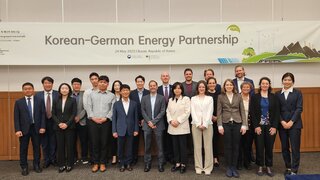4th Meeting of the WG1 “Energy Transition”
Working Group Meeting

On the 24th of May 2023, the 4th meeting of the Working Group 1 on “Energy Transition” took place at the Busan Exhibition and Convention Center in Busan, Korea. Aligned with the theme of a preceding workshop on public acceptance for wind energy, which was hosted by the Korean-German Energy Partnership team on the previous day, the first part of the meeting focused on wind energy deployment and its acceptance.
After representatives from the Korean Ministry of Trade, Industry and Energy (MOTIE) and the German Federal Ministry for Economic Affairs and Climate Action (BWMK) provided an overview and an update on offshore wind policy in the respective country, insights from the workshop on public acceptance were shared. In Korea, the expansion of offshore wind energy is gaining momentum. Korea has recently introduced the expansion target of 19.3 GW wind energy capacity by 2030 in the 10th Basic Plan on Electricity Demand and Supply (compared to 0,1 GW in 2021). Korea currently discusses the introduction of a one-stop-shop system for offshore wind projects that would centralize and simplify auction and approval procedures. The government also plans further measures, such as profit-sharing, to increase acceptance of local residents and fishers. In comparison, Germany has a longer track record and more experience with the deployment of wind energy and works with a centralized model for planning and commissioning. In 2021, the total installed capacity of offshore wind energy amounted to 7.8 GW. While the technology generally enjoys good acceptance among the German population, reaching the ambitious government targets of 30 GW by 2030, 40 GW by 2035 and 70 GW by 2045 within the relatively small Exclusive Economic Zone (EEZ) (33,000 km² compared to 430,000 km² in Korea) remains a challenge.
The second part of the meeting concentrated on the definition and planning of future activities of the working group. Focus topics are, amongst others, in-depth exchange on offshore wind, energy efficiency in buildings, status and policies for heat pumps, and power supply security. Both sides are looking forward to future cooperation and to exchange ideas on how to achieve each country’s climate ambitions.